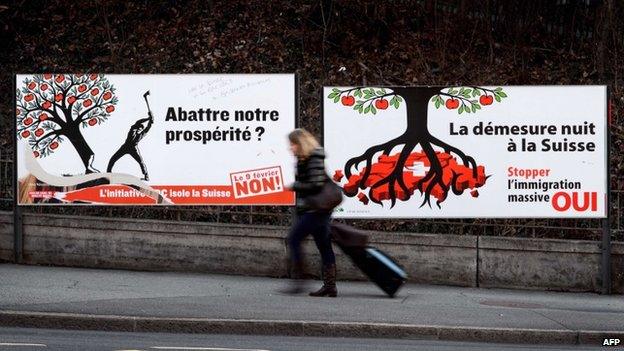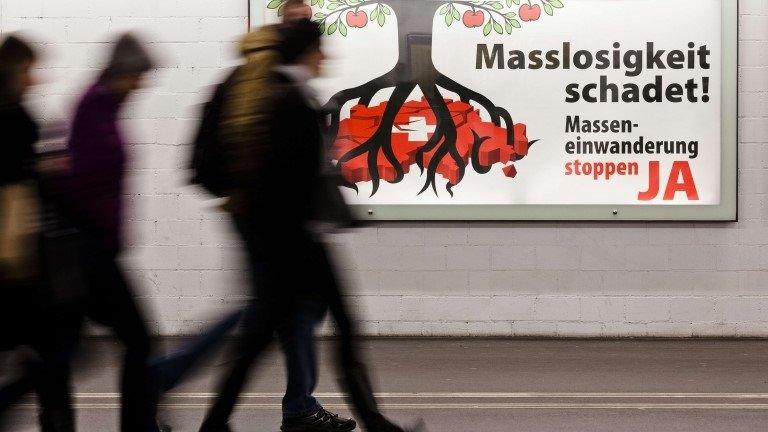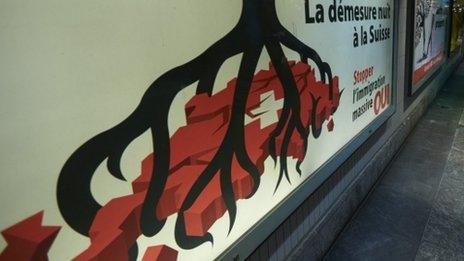Swiss migration quotas: Rift with EU grows
- Published

Switzerland may be treading a lonelier path in Europe
How far should non-EU member Switzerland follow the bloc's rules - and should the EU punish it if it does not?
The question has become live since the Swiss voted to introduce immigration quotas - contrary to the freedom of movement agreement it had signed with the EU.
And Brussels is aware that its response could have consequences in other countries which may seek to loosen their ties with the European Union.
"Switzerland has more free trade agreements with the big economies than we do," says the leader of the UK Independence Party, Nigel Farage. He seems to see Switzerland as a shining example of just how well a country can do outside the EU.
"Switzerland… has to pay into the European Union coffers, they have to obey all the European Union laws… they are utterly powerless," says Britain's Deputy Prime Minister Nick Clegg, on the other hand.
He regards Switzerland's agreement to most EU policy as the worst of all possible worlds: accepting the legislation, with no say on how it is developed.
Crucial economic ties
Switzerland has full access to the EU single market, and its economy depends on good relations with Europe - more than 60% of its goods are sold in the eurozone.
So although the Swiss government has negotiated some potentially very promising trade agreements with other countries - notably China - access to Europe's single market is crucial, and without it, the Swiss economy could not succeed.

The Swiss were divided almost 50-50 on the referendum; one poster suggested prosperity would suffer while another said mass immigration was harmful
The EU takes the view, though, that access to the single market, and to many other pan-European projects, depends on signing up to other common European policies, in particular free movement of people.
And that applies whether you are an EU member or not.
People's rebellion
But on 9 February this year, amid growing concern that the rate of immigration from EU countries was far higher than anyone had predicted, the Swiss voted in a nationwide referendum to reintroduce quotas, effectively abandoning its free movement agreement with the EU.
The Swiss government had opposed the quota proposal. It warned that such a vote could trigger retaliatory measures from Brussels.
Within weeks the EU had excluded Switzerland from the Erasmus Plus student exchange programme.
Student Julia Hofstetter, who had spent the last six months preparing for an exchange year at the University of Copenhagen, said she was "shocked".
"I just can't imagine a life without being able to travel, work and study where I want," said Ms Hofstetter.
But those who oppose free movement think the difficulties now facing Ms Hofstetter and other Swiss students are a small price to pay for regaining control of Switzerland's borders.
"The disadvantages to us of keeping free movement of people are much bigger [than any problems for students]," said Luzi Stamm, member of parliament for the right-wing Swiss People's Party and a key campaigner for the reintroduction of quotas.
"The Swiss system is such that you can change decisions relatively quickly, and I'm very glad we did so.
"I do believe any pressure the European Union uses now is less of a problem than totally open borders for immigration."
Business uncertainty
But that assertion may be tested by further consequences. The EU has also suspended Swiss participation in the Horizon 2020 research fund, and frozen talks on a long-awaited energy trading agreement.
Perhaps most worrying of all, multinational companies based in Switzerland are starting to feel uneasy.
The oil services giant Weatherford recently announced it would be moving its European headquarters from Switzerland to Ireland. The company told its shareholders in a blunt statement that recent votes on pay limits for top executives, and now on curbing immigration, had made Switzerland "unpredictable".

Some fear uncertainty over government policy could hit Swiss business
Switzerland's unique system, in which popular referendums can overturn government policy, can lead to a dangerous "uncertainty", admits Frederique Reeb-Landry, of Geneva's business association.
But the Swiss people have spoken, and their government is now spending long days and nights searching for what it calls a "compromise" with Brussels.
But the EU has already said free movement and quotas are incompatible.
To offer free trade without free movement to a non-member would be a huge political risk - perhaps prompting countries like Britain, which have made their doubts about free movement clear, to see life outside the union as more attractive.
"I don't think we will be able to square this circle," said Ivo Scherrer, founder of a new political group called Operation Libero, designed, he says, to offer a different, less isolationist vision for Switzerland.
"Our [current] strategy makes us vulnerable," he said. "Switzerland is bound to lose access to European markets and institutions."
So is the Swiss bilateral route not a strategy to recommend to big member states with big doubts about the EU?
"Britain would have to decide for itself whether such an isolationist strategy is worth the cost. I personally think it's not," Mr Scherrer said.
Others think differently. As the retaliatory measures from the EU keep coming, Mr Stamm warns Brussels' tactics could backfire.
"Switzerland is a little country, and it's not powerful," the politician said. "If the European Union wants to play a power game we will lose.
"But what kind of a European Union is this? I grew up with the conviction that the European Union is something positive, something for the future of Europe.
"If the European Union starts to play power games against little countries then that's the beginning of the end."
- Published9 February 2014

- Published9 February 2014
- Published8 February 2014
